My code has a structure type-defined as follows:
typedef struct
{
Structure_2 a[4];
UCHAR b;
UCHAR c;
}Structure_1;
where the definition of Structure_2 is as follows:
typedef struct
{
ULONG x;
USHORT y;
UCHAR z;
}Structure_2;
There are also two functions in the code. The first one (named setter) declares a structure of type “Structure_1” and fills it with the data:
void setter (void)
{
Structure_1 data_to_send ;
data_to_send.a[0].x = 0x12345678;
data_to_send.a[0].y = 0x1234;
data_to_send.a[0].z = 0x12;
data_to_send.a[1].x = 0x12345678;
data_to_send.a[1].y = 0x1234;
data_to_send.a[1].z = 0x12;
data_to_send.a[2].x = 0x12345678;
data_to_send.a[2].y = 0x1234;
data_to_send.a[2].z = 0x12;
data_to_send.a[3].x = 0x12345678;
data_to_send.a[3].y = 0xAABB;
data_to_send.a[3].z = 0x12;
data_to_send.b =0;
data_to_send.c = 0;
getter(&data_to_send);
}
The compiler saves data_to_send in memory like that:
The second one named getter:
void getter (Structure_1 * ptr_to_data)
{
UCHAR R_1 = ptr_to_data -> b;
UCHAR R_2 = ptr_to_data -> c;
/* The remaining bytes are received */
}
I expect that R_1 will have the value “00”, and R_2 will have the value “00”.
But what happen is the compiler translates the following two lines like that:
/* Get the data at the address ptr_to_data -> b,
which equals the start address of structure + 28 which contains the
value “AA”, and hence R_1 will have “AA” */
UCHAR R_1 = ptr_to_data -> b;
/* Get the data at the address ptr_to_data -> c,
which equals the start *address of structure + 29 which contains the
value “BB”, and hence R_2 will *have “BB” */
UCHAR R_2 = ptr_to_data -> c;
The compiler adds padding b/yte while saving the structure in stack, However when it starts reading it, it forget what it did (and includes the padding bytes in reading).
How could I inform the compiler that you should skip the padding byte while reading the elements of structure ?
I don't want a work around to solve this problem, I am curious to know why the compiler behaves like that ?
My compiler is GreenHills and My target is 32-bit
